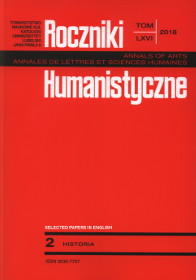The Attitude of Uniate Bishops towards Calendar Reforms in the Latter Half of the 18th Century
The Attitude of Uniate Bishops towards Calendar Reforms in the Latter Half of the 18th Century
Author(s): Dorota WeredaSubject(s): History, Modern Age, 18th Century
Published by: Towarzystwo Naukowe KUL & Katolicki Uniwersytet Lubelski Jana Pawła II
Keywords: Uniate Church; calendar reforms; Uniate bishops; 18th century; reduction of holidays; liturgical calendar of Uniate Church
Summary/Abstract: The Polish version of the article was published in Roczniki Humanistyczne vol. 59, issue 2 (2011).The provisions of the Union of Brest guaranteed the use of the Julian calendar in the Uniate Church. In the second half of the 18th century, as a result of the socio-political changes and the so-called reduction in holidays in the Latin Church the question of a reformed calendar was brought up among the hierarchs of the Uniate Church. Its elaboration and corresponding debates showed that the calendar was clearly considered to be an element of identification for all the faithful and an important factor creating a sense of separateness and identity in the multidenominational and multinational Polish Republic. The issue of reforming the calendar used by the Uniate Church was raised at the Great Sejm, but a new list of feasts was compiled by Uniate bishops during the congress of 17th September 1790 held in Warsaw. The hierarchy of the Uniate Church was also obliged to take a stance on the changes in the calendar introduced by the invading countries. The actions taken by Uniate hierarchs in the 18th century reflect an attempt to combine economic reasons with religious ones as well as social influences dictated by the ideas of the Enlightenment.
Journal: Roczniki Humanistyczne
- Issue Year: 66/2018
- Issue No: 2SP
- Page Range: 79-101
- Page Count: 23
- Language: English

